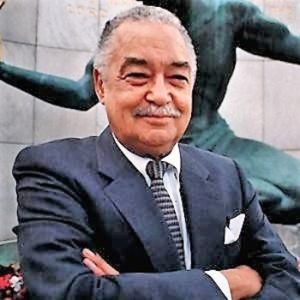
Coleman Young
On this date in 1918, Coleman Young, a Black politician, was born.
Coleman Alexander Young was in Tuscaloosa, AL. His family moved to Detroit when he was 5, making their home in the ethnically and racially mixed Black Bottom neighborhood. Drafted at the beginning of World War II, Young served as a bombardier and navigator with the Tuskegee Airmen. Toward the end of the war, Young and about 100 other Black men were arrested for demanding service at a segregated officers' club in Indiana. Young managed to get word to the Black press. Within days, he was released, and the Army began integrating the club.
After the war, Young returned to Detroit, where he became a union organizer. But he lost his job when the head of the United Auto Workers Union disliked the commotion created by Young and other Black dissidents. So Young took his first political job, working for Henry A. Wallace, the 1948 presidential candidate of the Progressive Party. By 1952, Young's work for the Black community had brought him to the attention of the House Un-American Activities Committee, which was investigating the Communist Party in the United States. Branded a subversive, Coleman was called to testify but refused to answer the committee's questions.
In 1964, Young won a seat in the Michigan Senate. Over the next decade, he would rise to become the Democratic floor leader, and, in 1968, he became the first Black chosen to represent Michigan on the Democratic National Committee. He was later selected as the DNC's vice chairman. In 1973, Young, then a Michigan state senator, made history when he was narrowly elected mayor of Detroit, the first African American to lead what was then the nation's fifth-largest city.
In the ensuing years, he built enormous grassroots support that carried him to easy re-election four times. But while he was credited with bringing the city's Black population into a position of political power and integrating the municipal workforce, his critics saw a man who was sometimes profane and rarely apologetic, who often alienated the business community and presided over Detroit's precipitous economic decline during the 1970s and 1980s. His 1989 re-election campaign was rocked when a female city employee accused Young of fathering her son. Genetic tests confirmed that the mayor was the father, and her paternity suit was settled.
In the late 1980s, Young, who often complained of FBI harassment, had his townhouse bugged by federal agents during an investigation into municipal corruption. Twice divorced, Young generally kept a low profile after his retirement, though he did write his autobiography. Coleman Alexander Young died after a long battle with emphysema on November 29, 1997.